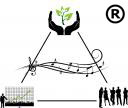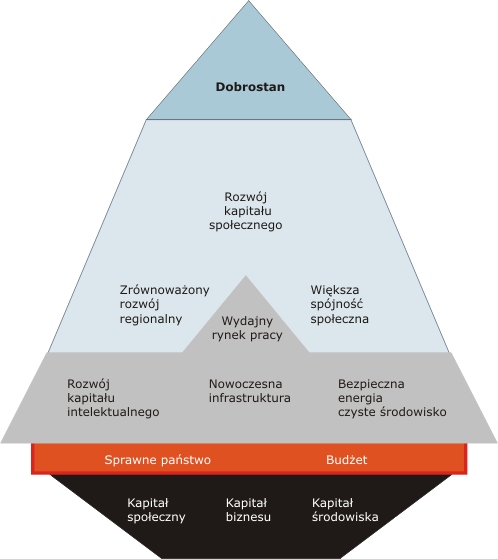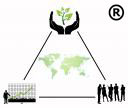[polish]Głos w publicznej dyskusji nad zieloną księgą „Polska 2030. Wyzwania rozwojowe”
17 czerwca 2009 Premier Donald Tusk zaprezentował raport „Polska 2030. Wyzwania rozwojowe”. Dokument wymienia 10 najważniejszych wyzwań, jakie stoją przed Polską w najbliższych dwóch dziesięcioleciach:
- Wzrost i konkurencyjność
- Sytuacja demograficzna
- Wysoka aktywność zawodowa oraz adaptacyjność zasobów pracy
- Odpowiedni potencjał infrastruktury
- Bezpieczeństwo energetyczno-klimatyczne
- Gospodarka oparta na wiedzy i rozwój kapitału intelektualnego
- Solidarność i spójność regionalna
- Poprawa spójności społecznej
- Sprawne państwo
- Wzrost kapitału społecznego Polski.
Po przeczytaniu raportu, zresztą bardzo ładnie napisanego, nasuwa się szereg refleksji. W kilku miejscach jest używane określenie zrównoważony rozwój, który czasem jest dopełniany określeniem zrównoważony rozwój regionalny. W takim właśnie duchu jest napisany raport, który ma być bazą dla wieloletniej Strategii Rozwoju Polski. Nie będzie to strategia, która implementuje Strategię Zrównoważonego Rozwoju (SDS), którą UE traktuje, jako nadrzędną w stosunku do Strategii Lizbońskiej. Oznacza to, że w dniu dzisiejszym Polska nie ma obowiązującej Strategii zrównoważonego rozwoju i jej mieć nie będzie w najbliższym czasie, chyba, że publiczna dyskusja nad Raportem coś zmieni.
We wrześniu 2009 będzie analiza wdrażania SDS w krajach UE…
Czy w takim razie możemy mówić o skoku cywilizacyjnym?
Obawiam się, że tak przedstawiony model polaryzacyjno dyfuzyjny rozwoju nie gwarantuje skoku cywilizacyjnego ( model zamieszczony ww. Raporcie w części „Polska 2030 – rekomendacje końcowe” , strona 375 http://www.polska2030.pl/ ).
Uzasadnienie:
Jako solidne fundamenty rozwoju Polski przyjęto jedynie rozwój demograficzny, wzrost gospodarczy i sprawne państwo. Autorzy raportu, z trzech kapitałów zrównoważonego rozwoju widzą jedynie dwa: kapitał społeczny i gospodarczy (sprawne państwo to kapitał społeczny). NIE WIDZĄ KAPITAŁU ŚRODOWISKA!
Planowane polityki i wskaźniki sukcesu nie zawierają tematów związanych ze środowiskiem.
Do 2030 roku nie planuje się zmian w systemie podatkowym w kierunku przenoszenia obciążeń podatkowych z pracy na zużycie zasobów i energii lub zanieczyszczenie środowiska.
Brak kapitału środowiska w fundamentach rozwoju Polski będzie powodował problemy finansowe wspólnot lokalnych w realizacji delegowanych zadań i usług środowiska – (planowane Welfare Society).
Komunikacja, edukacja, rynek pracy, zaufanie społeczne, sprawne państwo to bardzo ważne elementy wzrostu, ale w perspektywie 20 lat brak kapitału środowiska w fundamentach rozwoju Polski to duży błąd. Kapitał środowiska rozumnie używany może dać duży rynek pracy i przynieść ogromne zyski w dłuższej perspektywie czasu, a o takiej perspektywie mówi Raport. Integrowanie trzech aspektów (biznes, społeczeństwo, środowisko naturalne) do każdego działania jest sprawą kluczową.
Propozycja zmiany modelu
Co ten model oznacza w porównaniu z modelem autorów raportu Polska 2030? To wizja włączenia kapitału środowiska, jako istotnego aspektu każdego działania, czy to produkcyjnego, usługowego, finansowego, administracyjnego, czy działania sektora zdrowia, kultury, sportu, turystyki. To wizja dbałości o jakość życia, dobrostan z przesunięciem wagi w kierunku od „mieć” do „być”. To nie oznacza hamulca rozwoju tylko nadanie rozwojowi kierunku na miarę XXI wieku.
Zgodnie z prawem ochrony środowiska, w którym zdefiniowany został zrównoważony rozwój, raport, który pretenduje do bycia strategią , podlega ocenie oddziaływania na środowisko.
Uważam, że jeżeli nie zostaną wprowadzone istotne zmiany, jak np. wyżej zaprezentowane, to oceny oddziaływania na środowisko strategii i programów, które powstaną w oparciu o opublikowaną w czerwcu 2009 wersję raportu „Polska 2030. Wyzwania rozwojowe”, powinny być negatywne.
Dodatkowa propozycja
Uważam, że warto rozważyć włączenie Strategicznej Karty Wyników do zarządzania rozwojem Polski stawiając w roli „Klienta” zarówno gospodarkę, społeczeństwo , jak i środowisko. Co oznacza, że mierniki sukcesu zamieszczone w Raporcie powinny zostać poszerzone o docelowe wskaźniki środowiskowe.
Wanda Pazdan
[/polish] [english]Poland 2030. Development Challenges. Voice in the public discussion on the Green Paper “POLAND 2030 – Development challenges”
On June 17, 2009, the Prime Minister of Poland, Donald Tusk presented a report “POLAND 2030 – Development challenges.” The document presents 10 biggest challenges Poland will be facing within the next two decades:
- Growth and competitiveness
- Demographic condition
- High professional activity and adaptiveness of labour resources
- Adequate infrastructural potential
- Energy and climate safety
- Economy based on development of knowledge and intellectual capital
- Solidarity and regional cohesion
- Improvement of social cohesion
- Performing state
- Poland’s social capital growth.
The expression ‘sustainable development’ has been used several times , sometimes with additional word: ‘regional.’ It is clear that the report, which is to be the framework for a long-term Strategy for Development of Poland, does no implement the EU Sustainable Development Strategy (UE SDS) –http://ec.europa.eu/sustainable/docs/renewed_eu_sds_pl.pdf, which according to the EU takes priority over the Lisbon Strategy. This means that as of today Poland has no binding Sustainable Development Strategy and it will not have one in the near future, unless the public discussion on the Report changes it.
In September 2009 Member States of EU plan the analysis of SDS implemention in the countries of EU …
In the face of the above, talking about ‘civilisational leap’ – isn’t it slightly exaggerated?
I am afraid that the presented polarisation and diffusion model of development does not guarantee the civilisational leap (the model can be found in the section “POLAND 2030 – Development Changes FINAL RECOMMENDATIONS,” page 375 of the Report in Polish and page 6 in English version of Final Recomendations http://www.polska2030.pl/ ).
Justification:
Only demographic development, economic growth and performing state were assumed as solid foundations for development of Poland. Out of three sustainable development capitals, the authors of the report notice only two: social and economic (performing state is the social capital). THEY FAIL TO SEE THE ENVIRONMENTAL CAPITAL!
The planned policies and indicators of success do not include topics related to the environment.
Till 2030 no changes are planned in the tax system toward shifting the tax burden from labour to consumption of resources and energy or environmental pollution.
Lack of the environmental capital in Poland’s development foundations will result in financial problems faced by local communities in implementing delegation of tasks and services pertaining to, for example, social circles – (planned Welfare Society).
Communication, education, labour market, social trust, performing state are all very important development factors, but failing to include the environmental capital in the foundations for development of Poland for the next 20 years is a big mistake. Reasonably used environmental capital may provide a big labour market and generate enormous profits in the long term – the Report discusses long term issues! Integration of three aspects (business, society, environment) with each action is crucial.
Proposal to amend the model
How different is this model comparing to one presented by the authors of POLAND 2030 report? It is the vision of including the environmental capital, as significant dimension of each action, irrespective of whether related to production, service, finances, administration, healthcare sector, culture, sports, or tourism. This is the vision which cares about the quality of life, the well-being in which the shift is made from “to have” to “to be.” It does not imply an obstacle to the development but rather indicates a direction fitting for the 21st century.
Under the environmental law, which defines sustainable development, the Report, which aspires to be a base for strategy, is subject to the environmental impact assessment.
I think some significant changes should be made in the model presented by the authors of the Poland 2030 – as for example those presented above. Otherwise the environmental impact assessments of strategies and programs created in the framework of the version of the report “POLAND 2030 – Development challenges,” published in June 2009, should be negative.
Additional proposal
Inclusion of the Balanced Scorecard in the Polish management process, where the economy, society and the environment would be treated as the “Client,” is another thought to ponder. In other words, tokens of success described in the Report should be extended by target environmental quality indicators.
Wanda Pazdan
[/english]












